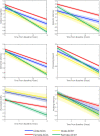Subjective cognitive decline is a better marker for future cognitive decline in females than in males
- PMID: 36581949
- PMCID: PMC9798694
- DOI: 10.1186/s13195-022-01138-w
Subjective cognitive decline is a better marker for future cognitive decline in females than in males
Abstract
Background: The identification of biomarkers for early detection of Alzheimer's disease (AD) is critical to the development of therapies and interventions targeted at symptom management and tracking the pathophysiology of disease. The endorsement of subjective cognitive decline (SCD) has emerged as a potential indicator of early change in cognitive status that may be predictive of future impairment at a time when measurable declines in neuropsychological performance cannot be detected. While there are numerous findings revealing sex differences in the prevalence of AD, there is a paucity of research examining sex differences in SCD. Therefore, the goal of this project was to determine if the relationship between the endorsement of SCD and future cognitive changes differ as a function of biological sex.
Methods: A sample of 3019 male and female healthy older adults (2188 without SCD, 831 with SCD), with a mean follow-up time of 5.7 years, were included from the Rush Alzheimer's Disease Center Research Sharing Hub. Linear regressions were performed to determine group differences in baseline cognitive scores, while linear mixed-effects models were completed to determine group differences in the rate of cognitive change over time.
Results: Individuals endorsing SCD had significantly lower baseline cognitive scores and increased rates of decline in all cognitive domains compared to those without SCD. Males exhibited significantly lower scores in baseline performance in global cognition, episodic memory, and perceptual speed regardless of SCD classification. Females with SCD were found to decline at significantly faster rates than both males with SCD and males and females without SCD in all cognitive domains over a maximum 15-year follow-up period.
Conclusions: SCD is related to lower baseline cognitive performance and faster cognitive decline compared to those who do not endorse SCD. Females with SCD have the fastest rate of decline suggesting that SCD may be more predictive of future decline in females than in males. Targeted assessments of SCD may allow for the identification of individuals for inclusion in intervention trials, and other research studies, aiming to attenuate casual disease processes, which may ultimately aid in the mitigation of sex disparities in AD.
Keywords: Alzheimer’s disease; Cognitive change; Sex disparities; Subjective cognitive decline.
© 2022. The Author(s).
Conflict of interest statement
The authors declare that they have no competing interests.
Figures


Similar articles
-
Subjective Cognitive Decline Is Associated With Lower Baseline Cognition and Increased Rate of Cognitive Decline.J Gerontol B Psychol Sci Soc Sci. 2023 Apr 1;78(4):573-584. doi: 10.1093/geronb/gbac178. J Gerontol B Psychol Sci Soc Sci. 2023. PMID: 36373799 Free PMC article.
-
Sex differences in the relationship between olfactory and cognitive impairment among subjects with subjective cognitive decline and mild cognitive impairment.Biol Sex Differ. 2025 Feb 13;16(1):12. doi: 10.1186/s13293-025-00691-x. Biol Sex Differ. 2025. PMID: 39948615 Free PMC article.
-
Impacts of baseline biomarkers on cognitive trajectories in subjective cognitive decline: the CoSCo prospective cohort study.Alzheimers Res Ther. 2023 Aug 7;15(1):132. doi: 10.1186/s13195-023-01273-y. Alzheimers Res Ther. 2023. PMID: 37550761 Free PMC article.
-
A Systematic Review of Subjective Cognitive Characteristics Predictive of Longitudinal Outcomes in Older Adults.Gerontologist. 2023 May 9;63(4):700-716. doi: 10.1093/geront/gnac109. Gerontologist. 2023. PMID: 35908232
-
Evolving Evidence for the Value of Neuroimaging Methods and Biological Markers in Subjects Categorized with Subjective Cognitive Decline.J Alzheimers Dis. 2015 Sep 24;48 Suppl 1:S171-91. doi: 10.3233/JAD-150202. J Alzheimers Dis. 2015. PMID: 26402088 Review.
Cited by
-
Examining Demographic Factors, Psychosocial Wellbeing and Cardiovascular Health in Subjective Cognitive Decline in the Brain Health Registry Cohort.J Prev Alzheimers Dis. 2024;11(3):787-797. doi: 10.14283/jpad.2024.39. J Prev Alzheimers Dis. 2024. PMID: 38706295 Free PMC article.
-
Alzheimer disease seen through the lens of sex and gender.Nat Rev Neurol. 2025 May;21(5):235-249. doi: 10.1038/s41582-025-01071-0. Epub 2025 Apr 14. Nat Rev Neurol. 2025. PMID: 40229578 Review.
-
Association of objective subtle cognitive difficulties with amyloid-β and tau deposition compared to subjective cognitive decline.Eur J Nucl Med Mol Imaging. 2025 Mar;52(4):1481-1495. doi: 10.1007/s00259-025-07080-x. Epub 2025 Jan 21. Eur J Nucl Med Mol Imaging. 2025. PMID: 39836215
-
A Systematic Review on Subjective Cognitive Complaints: Main Neurocognitive Domains, Myriad Assessment Tools, and New Approaches for Early Detection.Geriatrics (Basel). 2025 May 9;10(3):65. doi: 10.3390/geriatrics10030065. Geriatrics (Basel). 2025. PMID: 40407572 Free PMC article. Review.
-
Towards characterizing subjective cognitive decline in older adults.J Alzheimers Dis. 2025 May;105(2):609-621. doi: 10.1177/13872877251330149. Epub 2025 Apr 17. J Alzheimers Dis. 2025. PMID: 40241516 Free PMC article.
References
Publication types
MeSH terms
Substances
Grants and funding
LinkOut - more resources
Full Text Sources
Medical

